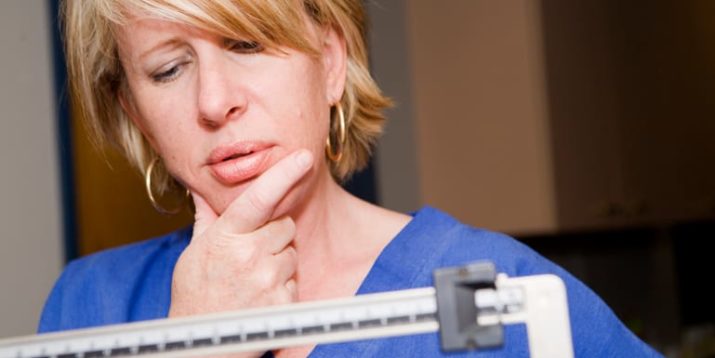Are Your Hormones Preventing You From Losing Weight?

If you’re a woman between the ages of 45 to 55 and you’re feeling particularly moody, fatigued, sleepless, and hot and sweaty, these may be symptoms of perimenopause, the sometimes rocky road leading up to menopause. If these changes weren’t enough to make you miserable, you may also see the numbers rising when you step on the scale.
What’s behind all these unwelcome changes? One word: Hormones. “Your estrogen levels are going up and down, even hour by hour, like a sputtering engine about to run out of gas,” says Louann Brizendine M.D., a professor of clinical psychiatry and founder of the Women’s Mood and Hormone Clinic at the University of California at San Francisco.
“The pituitary gland, the master control for all the body’s hormone-producing glands, is screaming at the ovaries to release more estrogen, but the ovaries are running out of fuel. Every once in a while the ovaries pump out a big secretion of estrogen.” Luckily the hormone chaos is temporary. Eventually your estrogen will level out, leaving you, your mood, and your temperature on a more even keel.
How Estrogen Can Cause Weight Gain
But weight can be another story. Women generally put on about a pound a year during perimenopause. It can be tough to combat because hormonal shifts change your body’s composition and the distribution of fat. “Unless you are blessed with a perfect appetite regulation mechanism you may struggle to maintain a healthy weight,” says Michael D. Jensen, M.D., endocrinologist at the Mayo Clinic in Rochester, NY.
As the ovaries’ output of estrogen declines, the body looks to fat cells, which also produce estrogen, and works to convert calories into fat to keep up with the demand. Unfortunately fat doesn’t burn calories at the same rate as muscle does, so women tend to put on more pounds. Research shows that two enzymes that help the body store fat are more active in postmenopausal women, making the weight particularly hard to budge. These new pounds tend to accumulate around the middle, which can increase the risk for heart disease and insulin resistance.
“Fat cells in postmenopausal women are ‘revved up’ to store fat compared with premenopausal women,” says Jensen. “That by itself doesn’t change the fact that to gain weight you must consume more calories than you burn, but it sets up a scenario where, if your body responds to increased fat storage as if more food needs to be consumed, it can be a challenge.”
Testosterone, which plays a key role in creating lean muscle mass, also starts to dip, compounding the problem and slowing metabolism. At the same time, surging progesterone levels cause bloating and water retention, which can make it harder to get into your skinny jeans.
How to Combat Hormonal Weight Gain
The good news is that weight gain is not inevitable. An international study involving 17,000 women found that those put on an eating plan that included plentiful amounts of fruits, vegetables, and whole grains not only counted fewer hot flashes than women in a control group, but were three times more likely to have lost weight over the year of the study.
And in data from the University of Pittsburgh, women asked to consume a low-calorie diet and to burn at least 1000 calories a week through exercise for a year had smaller waistlines and were more likely to be at or below their pre-study weight than a similar group of women who didn’t make these lifestyle changes.
That means your workout is more important than ever. Strength training, in particular, is your secret weapon against hormone-related weight gain because it helps to build muscle mass, while making you look and feel your absolute best.
Male Menopause
Men also experience a decline in sex-related hormones, mostly testosterone, as they age. It’s called andropause. The difference? Women’s estrogen levels plunge dramatically, triggering noticeable symptoms, while men’s testosterone levels decline more gradually—about one to three percent a year beginning in their thirties, according to Florence Comite, M.D., a reproductive endocrinologist in New York City.
In addition “men produce more estrogen as they age, particularly if they put on visceral (abdominal) fat,” she says. As a result of the hormone shifts, many men in their 40s and 50s may begin to feel run down. “The most common complaint I hear is lack of energy,” says Comite. Low testosterone levels can also lead to weight gain, a lack of sexual interest, or even erectile dysfunction.
For help with meal planning, especially if you’re trying to lose weight, try Fixate to help you achieve your weight loss goals!
